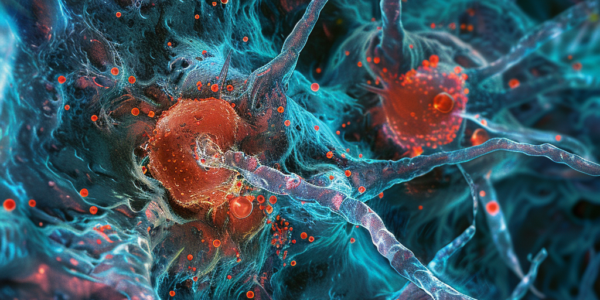Study Shows Olive Oil Consumption Linked to Lower Risk of Dementia-Related Mortality
Discover the potential benefits of consuming olive oil for reducing the risk of dementia-related mortality. A recent study published in JAMA Network Open highlights how incorporating more than a teaspoon of olive oil into your daily diet could lead to a significant decrease in the likelihood of dying from dementia. Learn more about the neuroprotective properties of olive oil and its positive impact on vascular health.
Groundbreaking Discovery in Medical Research Sheds Light on Inflammatory Bowel Disease
Groundbreaking discovery in medical research unveils key biological pathway for treating inflammatory bowel disease and related disorders. Existing drugs can target this pathway, offering hope for millions worldwide. Research team’s findings shed light on DNA segment regulating genes, providing insight into immune disorders. Ongoing efforts by researchers offer hope for improved treatments and quality of life for patients.
Mother’s Perspective on Pediatric Crohn’s Disease Advocacy
Read Stacy Dylan’s harrowing experience navigating her son’s journey with Crohn’s disease, shedding light on the emotional and physical toll of VEOIBD. Despite the challenges, Stacy remains a strong advocate for research and awareness in pediatric Crohn’s disease, emphasizing the importance of support and ongoing medical advancements.
New Menthol Derivatives Show Promise in Fighting Inflammation
Scientists have developed new compounds derived from menthol, known for its medicinal properties, to combat fat and inflammation. The study led by Professor Gen-ichiro Arimura from Tokyo University of Science discovered that menthyl esters of valine and isoleucine showed superior anti-inflammatory effects compared to menthol. Published in the Immunology journal, this research highlights the potential of these compounds in treating inflammatory conditions and opens up exciting possibilities in medicinal chemistry.
Study Shows 5:2 Fasting Diet May Have Anti-Inflammatory Effects on Liver Health
Discover the potential anti-inflammatory effects of a 5:2 fasting diet on liver health. A recent study by experts from the German Cancer Research Center and the University of Tübingen found that intermittent fasting can reduce signs of liver disease and lower levels of liver damage biomarkers. Learn how a 5:2 fasting regimen can make mice more resistant to developing non-alcoholic steatohepatitis (NASH) and the specific proteins responsible for these protective effects.
Patients with Suspected Bowel Disease Could Soon Bypass Long Waiting Lists for Scans
Patients with suspected bowel disease may soon have a faster route to diagnosis as they could refer themselves for scans, potentially bypassing long waiting lists and months of suffering with symptoms. Recent research suggests that by offering patients two faecal tests spaced apart by approximately two weeks, the identification of IBD markers can be expedited, enabling direct referrals for colonoscopies. Early detection and management through medications can significantly improve symptom control for the 800,000 individuals in the UK affected by IBD.
Study Reveals Metabolic Mechanisms Behind Anti-Inflammatory Effects of Glucocorticoids
A recent study published in Nature has revealed the metabolic mechanisms behind the anti-inflammatory effects of glucocorticoids, offering potential insights for the development of new anti-inflammatory drugs. The research delves into the molecular processes through which glucocorticoids exert their anti-inflammatory properties, shedding light on the reprogramming of mitochondrial metabolism in macrophages and the enhanced production of the anti-inflammatory metabolite itaconate. These findings have far-reaching implications for the development of new anti-inflammatory drugs and could lead to more effective treatments for immune-mediated inflammatory diseases.
Incorporating Anti-Inflammatory Vegetables into Your Diet Can Lower the Risk of Chronic Diseases
Combat inflammation with anti-inflammatory vegetables rich in essential nutrients such as vitamins, minerals, fiber, antioxidants, and phytochemicals. Research indicates that these nutrients can help combat oxidative stress, neutralize free radicals, and contribute to improved gut health, ultimately reducing inflammation. Registered dietitian Trista Best recommends incorporating spinach and kale into your diet for their anti-inflammatory properties and overall health benefits.
Foods That Contribute to Chronic Inflammation and How to Manage It with Diet
Chronic inflammation can lead to health issues like fatigue, trouble sleeping, and an increased risk of diseases. Diet plays a crucial role in managing inflammation, with certain foods like char-grilled meat, processed meat products, added sugar, refined carbohydrates, vegetable oils, alcohol, artificial trans fats, and excessive consumption of refined and processed foods contributing to its persistence. Choosing anti-inflammatory ingredients and whole, unprocessed foods can help combat inflammation and promote overall health.
Concerns Raised About Quality of Research Supporting Wim Hof Method
A recent systematic review of scientific studies on the Wim Hof method of cold water therapy has raised concerns about the quality of research supporting its claimed benefits. The review, published in the journal PLOS One, found that the quality of the studies was inadequate to fully support the effectiveness of the Wim Hof method without additional investigation. Despite Wim Hof’s remarkable feats and claims about the method’s benefits, the review emphasized the need for more high-quality research to verify these findings and cautioned against overestimating the method’s benefits based on the current evidence.










